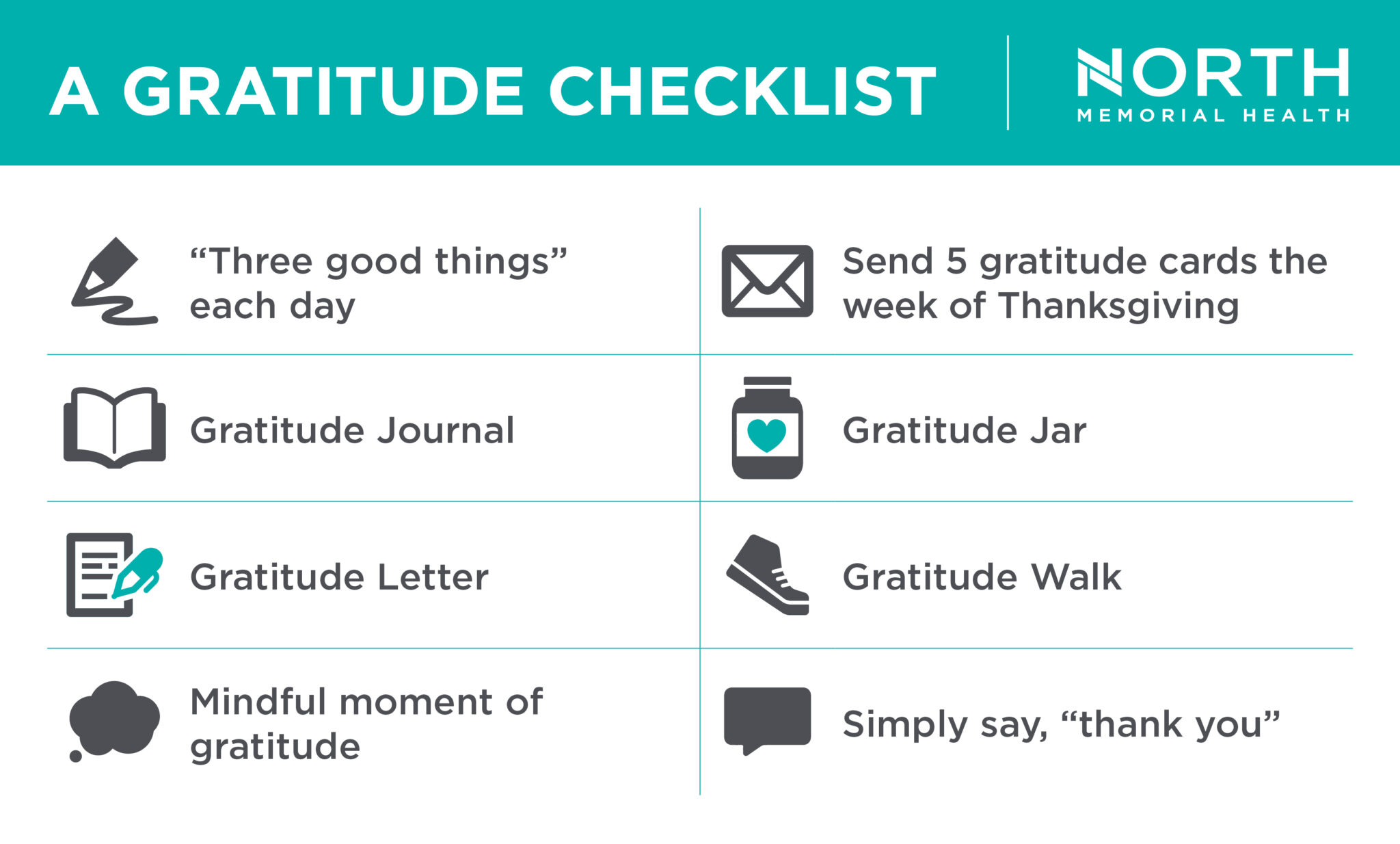Robert Emmons, a psychologist and gratitude researcher, defines gratitude as “an affirmation of goodness. We affirm that there are good things in the world, gifts and benefits we’ve received. We recognize that the sources of this goodness are outside of ourselves, frequently due to the actions of another person.” (Emmons, 2010; Emmons & McCullough, 2003).
Research demonstrates that small gestures of gratitude can positively impact on our well-being (Emmons, 2010; Emmons & McCullough, 2003). During times of adversity, such as the COVID-19 pandemic, a lens of gratitude is critical to sustain a hopeful outlook. Below is a list of gratitude practices to enhance your well-being during this holiday season.
1. “Three good things” each day.
Write down three good things at the end of each day- they can be big or small things – that made a positive difference in your day. Research on healthcare workers studying a 15-day gratitude exercise of logging “three good things” resulted in improved work-life balance for up to 6 months and significant benefits in happiness, depression, and emotional exhaustion (measure of burnout) for up to 1 year (Sexton & Adair, 2019). In my family, we set intentions at dinner to share at least one experience that happened in our day that we are grateful for; listening to other people share also contributes to feeling positive emotions.
2. A gratitude journal.
Take a few moments throughout the week to write down experiences or moments of gratitude that happened in your life; again, writing down our experiences can improve wellness.
3. A gratitude letter.
Write a letter to someone expressing thanks and share your appreciation to them. Challenge yourself to read your letter to them over Zoom or in person, socially distant, as a deliberate way to share your feelings of gratitude.
4. Mindful moment of gratitude.
Take this moment to focus on the goodness in the world and in your life. Be present and observe a positive experience such as an invigorating run, hugging your child, eating a ripe fruit, or an experience at work that went well. Gratitude strengthens positive emotions to focus on the present and increase your resilience in facing future challenges.
5. Send 5 gratitude cards the week of Thanksgiving.
Every year our family selects 5 people that have made a positive difference in our lives sometime in the past year. Together we recall what the positive experience was and why it was important to us. During the week of Thanksgiving, we send 5 cards in the mail to these special people to express our deep appreciation. Brainstorming positive, actions of others in our lives allows us to recall times of overcoming challenges, positive events, and of how this person’s actions was special to us. Narrowing this list down to 5 can be challenging as we recall teachers, doctors, neighbors, family, friends, or random acts of kindness which can often instill hope for the future. Often, the person who receives our card, feels our spontaneous love and appreciation going into their Thanksgiving celebration.
6. A gratitude jar.
Find a jar and several slips of paper. At the end of every day, write down one or two blessings/experiences of gratitude to get in the routine of focusing on gratitude. After a challenging today, pull out a slip of paper from the jar previously written and remind yourself of past moments of gratitude. If you can, write something down each day.
7. A gratitude walk.
Take a walk and make special intention to appreciate your surroundings. You might stop to notice squirrels gathering for winter, feel the fall breeze on your skin and appreciate seasonal changes, etc. Spend a few minutes focusing on each of your senses to be in the moment.
8. Simply say "thank you."
Keep your eyes open throughout the day and find reasons to say “thanks” to someone. Recognize small actions of the people around you that might be overlooked such as a partner that always makes the coffee in the morning or a friend who always is willing to listen.

